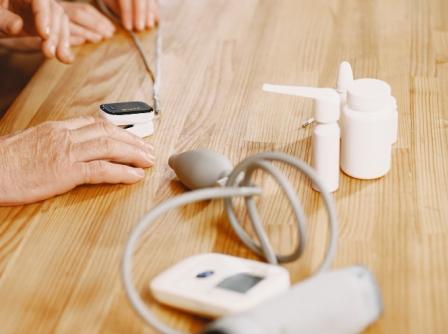High blood pressure, or hypertension, is a significant health concern in India, affecting a large portion of the population. The World Health Organization’s research on the worldwide effect of hypertension found that the ailment affects around 188.3 million individuals in India. Surprisingly, just 37% of these people are aware of their situation.
Shockingly, according to this analysis, if half of India’s hypertensive adults are able to control their blood pressure, at least 4.6 million fatalities may be avoided by 2040. This emphasises the critical relevance of early identification and appropriate management of hypertension in saving lives and improving public health.
The good news is that there are natural and effective ways to manage and control hypertension. Read on to know the details!
What is High Blood Pressure?
Blood pressure is the force of blood as it is pushed from the heart into the arteries. An average blood pressure level usually is less than 120/80 mm Hg. When blood pressure is higher than its normal level, blood rushes through the arteries with higher power. This phenomenon is known as high blood pressure or hypertension.
It puts more pressure on the delicate tissues within the arteries and can cause damage to the blood vessels. Hypertension is often referred to as a “silent killer” because it can go unnoticed for years.
Top 7 Natural Techniques to Manage High Blood Pressure
When it comes to managing hypertension, lifestyle choices have a significant role. Making certain healthful modifications may help you avoid or delay the need for medication. So here are the top 7 lifestyle changes that can help lower your blood pressure and keep it under control.
1. Exercise Regularly
Regular physical exercise not only lowers blood pressure but also improves mood, strength, and balance. It may also reduce your risk of diabetes and other forms of heart disease. If you’ve been sedentary for a long time, talk to your doctor about starting a safe exercise routine.
Start cautiously and progressively increase the intensity and frequency of your workouts. If you dislike going to the gym, you may get the same advantages from a walk, jog, or swim.
2. Eat a Nutritious Diet and Minimize Salt
To control blood pressure, you must eat a diet which includes a lot of fruits, whole grains, vegetables, and dairy (low-fat). It is also vital to avoid food rich in saturated fat and cholesterol. And always remember to incorporate potassium in your diet and minimise your intake of salt.
Potassium is best supplied via food sources such as fruits, beans, green leafy vegetables, and nuts rather than supplements.
3. Maintain a Healthy Weight
If you are overweight or obese, losing 5 to 10 pounds can help lower your blood pressure. However, it’s more than just the number on the scale. Pay attention to the excess fat around your waist, known as visceral fat. It is critical for your heart health and can have a long-term influence on your blood pressure.
Men should strive for a waist measurement of less than 40 inches, and women for fewer than 35 inches.
4. Find a Way to Handle Your Stress
Stressful events might produce a momentary rise in blood pressure. As the tension is relieved, things usually return to normal. However, constant stress in your life might cause high blood pressure. It’s challenging to eliminate all stress. However, adopting healthy methods to cope with it may significantly help.
Gratitude, meditation, taking relaxation breaks, and avoiding stressful situations are some methods to handle stress.
6. Improve Your Sleep
Sleeping fewer than six hours every night for several weeks might result in elevated blood pressure. Limiting naps in the day and creating a relaxing atmosphere in your room before bedtime may help you to sleep better. Most importantly, stop scrolling through your cell phone at bedtime.
If you have trouble sleeping on a regular basis, you should consult your doctor to diagnose if you have any troublesome conditions like Sleep apnea, restless leg syndrome, and insomnia. Identifying and treating the underlying reason can improve sleep quality.
6. Reduce Alcohol Consumption and Stop Smoking
Cutting on alcohol can help decrease blood pressure, and quitting smoking can enhance your general cardiovascular health. Yes! Making these lifestyle adjustments is easier said than done. But they have the potential to improve blood pressure levels significantly.
If you need any help or advice on how to make these adjustments, please ask your healthcare expert or get help from a good rehab centre!
7. Monitor Your Blood Pressure & Keep Your Medical Records Updated
Regularly monitoring your blood pressure at home is crucial for proactive health management, as it empowers individuals to track fluctuations, detect potential issues early, and collaborate effectively with healthcare providers to maintain optimal cardiovascular health.
Additionally, it becomes important to maintain medical records to provide a comprehensive insight into one’s health history. This, in turn, empowers healthcare professionals to make informed decisions, facilitating a personalized approach to care that caters to individual needs. You ask any medical professional, and they will agree. This is because it gives healthcare professionals a complete view of your health history.
To summarise, it is pretty feasible to control your high blood pressure without using medication. You can do it by implementing simple but effective lifestyle changes. Eat a healthy diet, exercise frequently, reduce stress, and get plenty of sleep! And remember to consult your doctor before making any big changes.
Here’s to a healthy and happy you!









